Rosario Shares Love
Every time Rosario enters a class she is received with an explosion of hugs and kisses from her little ones.
“Since I was young I dreamed to be surrounded by children, because I am the youngest in my family and I used to tell God that I wanted to work with children.”
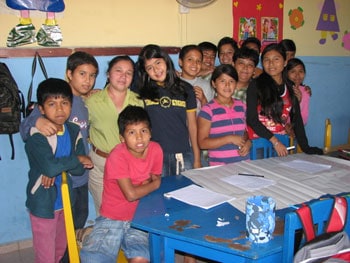
“God’s mission is being accomplished, and He put us here so we could accomplish His mission and take care of the children. I wanted to have many children, I dreamed all of that and God listens to us, so when the pastor told me to come and help here, I loved the idea.”
Rosario is already three years in this ministry. She started as a tutor, and since last year she is the director of the student center. To work in the center is very special for her; it is a blessing. (more…)
Presents for the King
The church was packed with 200 children and their parents, celebrating the pre-Christmas program with the Compassion child cevelopment center. When the host announced the opening of the program, the room burst with clapping.
Laboni was there with her sister Sraboni. Everything around Laboni was entirely new for her. She belongs to a Christian family, but in their lives Christmas is just like every other regular day. There has been nothing very special about Christmas except going to church in the morning.
But after Laboni and her sister got registered at the child development center, everything around her has been changing in a positive way. The meaning of Christmas has also changed.
Christmas in Colombia
The main room is decorated with Christmas posters. Children are laughing and talking. One can feel the atmosphere of Christmas, the musicians do not stop singing, while children finish eating dessert.
Holes in the Pockets
Aleja wakes up very early in the morning, as she does every Saturday, to go to the market and buy the groceries for the week. She takes with her the same amount of money she usually does, but to her surprise she can’t even buy half of the things she needs.
At home, Aleja has five small children waiting for her to bring them something to eat. She is a single parent, mother of two sponsored children from Betel Student Center in the city of Oruro. She was abandoned by her husband and left with her children.
The family lives in a very small and dark room where they have three beds, a small table, some chairs and a small, wrecked shelf. Outside of the room, they use a small space covered with old pieces of calamines as their kitchen.
Aleja works washing clothes. She earns around $21 per week, and that is how she supports her family. She uses the money to pay the rent, the water, the electricity, the gas and buy the food and some things her children need for school. (more…)
Yellow Leaf Spirits
In the high mountains of Northern Thailand lives an extraordinary tribe who have no written history and whose way of life is disappearing with the forests.
They knew only how to survive in the deep jungle, building homes from fresh banana leaves. They would sleep on the leaves and use them as a roof to protect from the rain and dew at night.
If they could not find food in the area nearby, they would move on deeper into the forest. They would wander in the forest, staying together in small groups. Education, a house, and clothing were of no value to them, as they had no use for these things living in the forest.
The isolated tribe was also afraid of strangers. If they met any outsiders, they moved away immediately, like spirits. They lived like this for centuries, the last nomadic tribe to survive in the northern forests of Thailand and Laos. (more…)
Benson’s New Classroom
Benson wakes up at 6:00 a.m. every Saturday excited that he will see his friends and learn Bible lessons. On this particular Saturday, the children at his child development center learn a life-lesson, and child development director, Mercy, takes them through the devotion.
It’s chilly and the teacher starts the lesson. As drum beats fill the air, children fill with excitement — the right mood for a story.
Teacher Mercy starts,
“Once upon a time there were two buckets that hung by the Simenya Well. They kept on being drawn by the residents of Simenya. One late afternoon, tired with the day’s work, they took time to rest and spoke to each other.”
At this point Teacher Mercy coughs and holds two buckets as visual aid while pointing them to the children.
In the background, one hears a symphony of coughs and sneezes from the children because of the weather. Her “classroom” is outside.
She continues,
“One of the buckets was always grumbling. It never looked at life cheerfully. On this particular day, as it rested outside the well it said to the other bucket, ‘I am tired of the life we lead. However full we are when we are drawn up out of the well, we are sent back empty again. This makes me disappointed and dissatisfied.’
The second bucket looked at life differently. It did not grumble because it looked at the positive side of life. It said, ‘That’s true, but I always look at it this way — that however empty we are when we are set down, we are always full when draw up.'”
Teacher Mercy declares the end of the story, looks at the children, sees the cloudy skies, and whispers a prayer to God, “Please Lord, help us build classrooms to house these children.”
For the last three years, trees randomly placed in the Simenya Child Development Center church compound have been serving as “classrooms” for the children. Unfortunately the days can be nightmares for some of the children in the center, especially when they come to the wall-less classrooms, during extreme weather conditions.
According to Mercy,
“The long rainy seasons fall in March to May, while the short rainy seasons are during the months of August to September and sometimes trickle into October.
These are dreaded months by children, teachers and parents alike. One is likely to meet children shivering in the chilly days with hands tightly clasped across their chest, to preserve the little body temperature.
It is during this period, we have seen children affected by periodic fever. These are the times when we see children walk out of class or even stay away from the classes, with parents citing fear of fever attack.”
During the hot season months, we have not been spared either. This area has characteristic dry spells, which leaves the indigenous trees without leaves. Scorching sunbeams through the sketchy branches penetrate the out-door classes. Because of this, Simenya Child Development Center has made numerous efforts to address this immense challenge.
Cultural Change in the Maasai Community
The Maasai community has been rearing cattle for years, all their known lifetime and history.
In fact, there is a joke that goes around Tanzania about how the Maasai people claim that all the cows in the world belong to them, and the Maasai have the duty to return the cows to their natural home, in the Maasai community, which is why in the past there has been cattle rustling in the community.
Looking Beyond the Horizon for New Hope
Maritza, from the window of her one floor house, is watching me as I come towards her home. It is made from planks of wood, painted in blue heaven, and between plank and plank the sunlight streams inside.
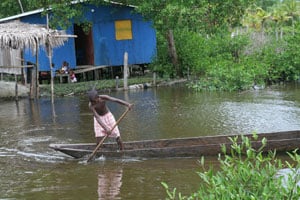 To get to Maritza’s house, I jumped from stone to stone to keep out of the mud and also crossed on planks above the stagnant water.
To get to Maritza’s house, I jumped from stone to stone to keep out of the mud and also crossed on planks above the stagnant water.
My guide is telling me that we are in the dry season. In the rainy season the rivers overflow the streets and the water rises up to the people’s waists, so they use boats to get around.
In those times the children get skin infections and fevers from the mosquito bites.
Maritza lives with Franklin and their six children; they lost three children because she was sick in those times.
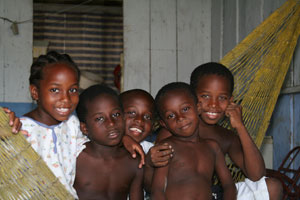
Today the boys are only in shorts and without shoes. I can see two single beds where they sleep together. Right now, they are enjoying the hammock hanging in the center of the main room.
At first, Maritza, 34 years old, is a little bit nervous to talk with me but she understands that their situation is like many families in Uraba. (more…)
Leadership Development in the Dominican Republic

César Antonio Beltran is the first graduate of the Dominican Republic’s leadership development program,* graduating summa cum laude with a degree in computer engineering in February 2008.
He has now traveled to the United States to pursue a master’s degree in Arts in Spiritual Formation and Discipleship at the Moody Bible Institute (MBI). Out of 47 students participating worldwide, César and two other LDP graduates received the Wess Stafford-Moody Scholarship last June.
While in Compassion’s child sponsorship program, César searched for his spiritual gifts by participating in almost all church ministries, and he realized that his field is working with the youth and adolescents. “With this in mind, MBI is going to prepare me specifically for this type of church work,” César says.
César’s parents see this learning opportunity as a result of his love for the Scriptures. “Since Tony (nickname for César) was small, he wrote Bible verses on a piece of cardboard and put it up on the wall,” recalls his father. “And many times, he met with his brother and his sister in his bedroom and they made contests of quick Bible search, text memorization, text analysis and things like that.”
Also, his mother, Ana Mercedes, explains:
“Tony took some very good Bible courses with a missionary who taught himwhat a Christian youth should be like and encouraged him and other youth by having them transcribe Bible books with their own handwriting. He gave them new Bibles for a prize.”
Kamrul Receives His Cycle Van
Kamrul received the cycle van you bought him! He received it eight days ago.
It was another hot afternoon at Suagram, and Mukta ran to her grandmother’s house. “Granny! Granny! Come out.”
An elderly woman came out; Mukta said loudly, “I am going to have a cycle van tomorrow. Now my father will drive my own cycle van.”
Her grandmother asked, “Who is giving you a cycle van?”
The 8-year-old girl replied proudly, “My Compassion center!”
The next day was very special for Mukta, her father, Kamrul, and their family. They were going to have a brand new van, as a gift from Compassion sponsors who read the U.S. blog.
Kamrul and his family dreamed about having their own cycle van for years. Although they considered Compassion as the great opportunity for their daughter’s development, they never thought that their dream of a cycle van could come true through the Compassion center. However God had a different plan for this family, and He used Compassion to bring blessings to them.
I reached Suagram Child Development Center at 8 a.m. Kamrul was there, waiting for me. He grabbed my hand and said, “Thank you so much, for what you did for us.”
I replied, “Don’t thank me. Thank Almighty God for his grace and thank the sponsors who made it possible.”
Kamrul said again, “I praised God thousands of times. Me and my family prayed for the sponsors and their families, that they could live a long, healthy and happy life.”
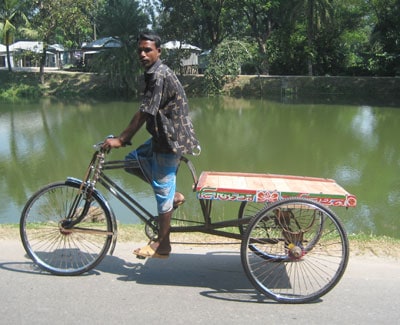
We went to the marketplace called “Ghaghar” to buy the cycle van. The child development center manager was also with us; he ordered the van the previous week. It was a nicely built cycle van.
The center manager was checking the cycle van, but I was observing the reaction on Kamrul’s face. There was a deep satisfaction and peace.
The center manager paid the bill and asked Kamrul, “Are you happy?”
He answered, “I couldn’t wish for more. This van will change the condition of my family.”
Kamrul took us on his new cycle van as his first passengers. He was driving faster than the previous time I rode his van. I thought there might be two reasons. The new cycle van was excellently made, and at that time Kamrul was the happiest man on the earth and wanted to fly.
We reached his house and paid him. Kamrul strongly refused to take money from me, but I was able to make him understand that he should take it as his first income from the van.
At his house, Mukta was waiting for us. As soon as Kamrul parked the van, little Mukta hopped on the van. She stood on the van and silently made us believe that it was her van.
Kamrul and his wife Rehana were getting busy to entertain us. The center manager tried to stop them, but Kamrul answered, “We couldn’t be able to give a treat to our beloved sponsors. So please let us entertain you with coconut water on behalf of the sponsors.”
Coconut water is a special drink in the rural areas; only special guests are entertained with coconut water. Kamrul and Rehana prepared and served coconut water to us. It was one of the sweetest and most refreshing drinks I have ever had.
Kamrul, Rehana, Mukta and little Sihab (Mukta’s younger brother) were sitting in front of us, and we were talking outside their house. A few neighbors also joined us.
I described to Kamrul and family about how our respected sponsors provided them the van. Kamrul shared his feelings:
“I am so pleased and amazed by the greatness of the Compassion sponsors. I struggled a lot with my family. Not even my own brother and sisters took care of us, but these people from thousands of miles away are thinking of our benefits.
This is amazing!
Now I can earn my own living and don’t have to pay the van owner daily. If I can work everyday then I won’t have any problem to maintain my family. At least I can buy food everyday for my children.
Please thank the sponsors on behalf of me and my family. Also tell them that their love is blessings for my family.
May God bless them and their children everyday!”
Rehana said, “Now my husband can work more freely. Hopefully we would overcome our difficult periods. Thanks to all the Compassion people and staff who made it possible for us. They think about us more than our own relatives.”
Mukta was having fun on the van. She said, “This is my van, and I will let my father drive it.”
Kamrul was laughing and replied, “Yes dear, it is your van.”
Mukta thanked all the sponsors in her own words and said in Bengali, “Amake van kine debar jonno tomader sobaike onek onek dhonnobad.” It means, “Many thanks to all of you for buying me this cycle van.”
Kamrul took his whole family on the van and had a fun drive. Later he picked up Mukta from the project on his van and took her home.
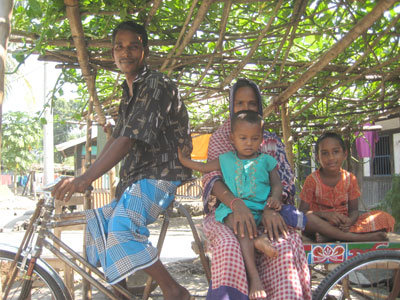
The gift amount was 10,200 Bangladeshi taka. The cycle van cost 9000 taka, and with the remaining 1,200 taka, the Compassion center bought a new pair of shoes for Mukta, a mosquito net, and two pillows for Kamrul’s family — things Kamrul and Mukta asked for.
It was a big day for this family. The satisfaction on Kamrul and Mukta’s face reminded me of the Grace of our heavenly Father.
Special thanks to all the sponsors who considered Kamrul as their own brother and Mukta as their own niece.
Today’s post is a followup to the August 7, 2008 post, A Day in the Life of a Bangladeshi Cycle Van Driver.
Nine Questions With Cesiah Magaña
You asked your questions of Cesiah, field communication specialist in Mexico, and she answered. Take it away, Cesiah.
1. First of all, thank you so much for all you do for the precious children of Mexico! My question is, as you go through each day seeing a multitude of needs in these children’s lives, what do you find yourself praying for most often? (Lindy)
Most of the time, I pray for their hearts. My main prayer is normally that they get to experience the love of Christ. I long for them to know how precious they are to God. I pray that they never give in to the idea of not being worthy or good enough to do anything they dream of.
2. How far do the students travel, on average, to get to the centers and how do they do so? (Walk, bus, etc.) (Beth Ingersoll)
Most of the children registered live very near the churches where they participate in the activities and where they are registered. It is very common for them to walk. As part of the program, Compassion Mexico considers children within 30 minutes walking distance.
In some of the child development centers, it is common to see a few children ride their bicycles to the center, but in those cases it is only a luxury some can afford.
There are other churches where the pastor’s vehicle or the cars owned by the church membership serve to bring children to classes. Every time they drive by the community, children line up to jump in and ride to the church. Many times these are old cars on bumpy and dirt roads, but the fact of being able to ride with the teachers or sparing the hot sun is well worth the tightness.
Finally, there are centers where teachers and staff members split by areas, and they walk the streets around the center to bring children in. Families then trust their children to go with the staff members to church.
Either if children walk by themselves or in big groups or ride their bikes to the projects, they normally wear a special shirt from the project or even uniforms, so it is very nice to watch children come into the centers because they fill the streets with joyful laughter.
7 Questions With David Adhikary
Thanks for asking your questions of David, the Compassion field communication specialist in Bangladesh. Here is the wisdom he has to share with us!
1. First of all, thank you so much for all you do for the precious children of Bangladesh! My question is, as you go through each day seeing a multitude of needs in these children’s lives, what do you find yourself praying for most often? (Lindy)
You are always welcome. Actually, I feel a deep pain when I find myself in a position where I can’t afford to help each of my children to solve their problems.
Every night I pray that at least they could have their dinner and have a sound and peaceful family environment.
2. I would like to know the specifics of how the global food crisis is affecting the people in Bangladesh and how it has affected Compassion’s program there. Have you cut back days that the children meet? Has it made a difference in the type of food that you can afford to serve the children? (Cheryl J)
The price of rice and other food products including lentils, flour, oil, and sugar are increasing continuously from last year.
According to different sources, the cost of the cheapest rice has increased by over 90 percent, and for the better grade rice, it is over 64 percent.
According to the statistics provided by the World Bank and United Nations, the daily income of a lower-level person in Bangladesh is between $1 and $2.
Each family requires at least four pounds of rice each day, which means if they only buy four pounds of the cheapest rice, they have to spend $1.18, which means they have little or no money left to buy vegetables, oil, and other food products.
Compassion Bangladesh hasn’t cut back the number of days that the children meet. Instead, we started an extra day of Compassion program.
Most of the child development centers provided a meal five days a week, but now they are providing a meal six days a week.
Some centers had to reduce their expense for food revenue; they decreased the quantity of food.
After receiving the support of the Global Food Crisis fund, this lack has been filled and children are getting food according to the new, revised menu.
Your support and prayer made it possible.
3. How far do the students travel, on average, to get to the centers, and how do they do so? (walk, bus, etc.) (Beth Ingersoll) (more…)


